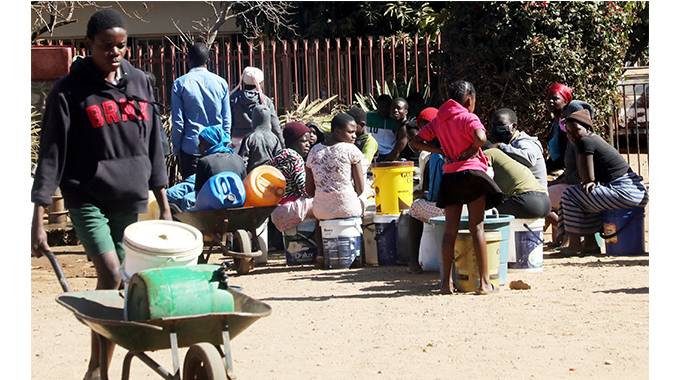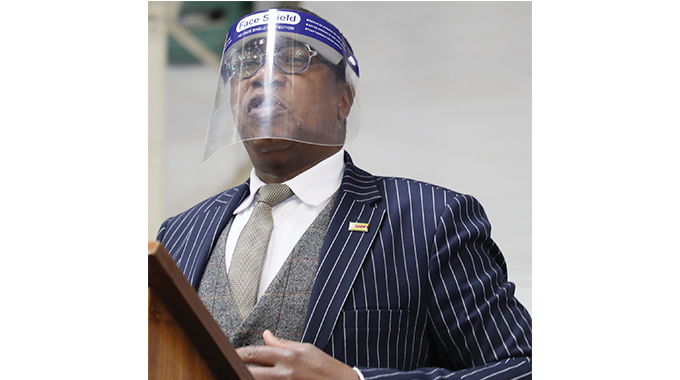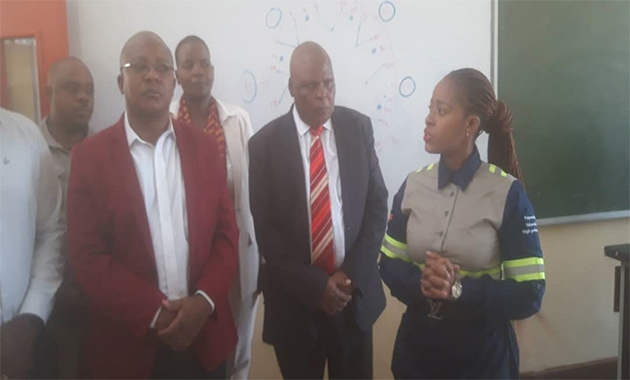Bulawayo water woes amid Covid-19 crisis

Andile Tshuma, Chronicle Correspondent
SOME Bulawayo suburbs have gone for more than three weeks without running water and residents have raised fears of contracting Covid-19 as social distancing fails at communal boreholes.
Tshabalala and Sizinda suburbs last got tap water on July 14 and there has been no explanation from the Bulawayo City Council.
Bulawayo has a 144-hour weekly water shedding exercise to manage dwindling levels at the city’s dams that are 26 percent full.
Residents in suburbs like Cowdray Park, Magwegwe West, Nkulumane and Emganwini that have been declared Covid-19 hotspots have implored council to ease water shedding so they can wash their hands more frequently and increase hygiene.
Sizinda suburb residents said prior to the latest dry spell, they would get water for an hour or less during the 24 hours in a week that they were supposed to have it from their taps as per council’s water shedding schedule.
It is harder for those with children in the house, as the many trips to the bathroom vis a vis the dwindling water levels stocked up in containers hardly tally.
Bathroom logistics are hard to manage and when nature calls, one has to answer.
For many, the inconvenience of going from one borehole to the next or one suburb to the next looking for somewhere to fill up containers, and having to brave the meandering queues for hours has become unbearable.
When Chronicle visited the affected suburbs, there were long winding queues at boreholes while some churches were allowing residents to fetch water at their premises.
Residents were failing to adhere to social distancing guidelines while a lot of unattended children were playing around the queues.
Magwegwe West suburb residents spoke of renewed panic on the water situation after learning that their suburb was a Covid-19 hotspot.

“We have heard that we are a Covid-19 hotspot, yet we are not being spared from the water shedding. The water bowser comes to Magwegwe but the water gets finished before we fill up. There is chaos at the boreholes. Council must save our lives,” said Mr Martin Mhepo.
Tshabalala residents said they feared the spread of Covid-19 through the communal boreholes as they were not sanitised.
“The bush pump handle is held by everyone when it’s their turn to pump water. There are no hand sanitisers. We could be spreading the virus unknowingly there. It’s difficult to practise social distancing. Some people have a tendency of wanting to jump the queue, so we all crowd near the pump to monitor the containers and the people there,” said Mrs Simelinkosi Ngulube from Tshabalala suburb.
Another Tshabalala resident who is also a home-based care worker, Ms Jennifer Ncube said the lack of running water affected her work.
“I am a home-based care worker and this situation is difficult as taking care of the sick and elderly requires water. I need to fetch water for my household and also fetch water to bathe the sick and to cook for them and enough water that they can use in their household in my absence. My work is difficult already, but it is better when running water is available,” she said.
“We are told to mask up and wash our hands regularly but it is difficult to wash hands with limited water. After struggling for three hours to fill up a 20-litre container, I will surely not waste it all washing hands but will use it for other purposes, risking myself and others because we now understand that Covid-19 is real. But water is not there. What can we do?” asked another resident, Ms Cecilia Sangweni.
Some residents called for council to deliver water through bowsers which they said have not been coming despite the water shortage.
Bulawayo City Council senior public relations officer Mrs Nesisa Mpofu had, by press time, not responded to questions from Chronicle.
In April, the local authority said some suburbs could go for eight months without water supplies as they are on high ground, if the scarcity continued to deteriorate.
Already parts of Magwegwe and Lobengula have gone for four months without their taps running.-@andile_tshuma












Comments